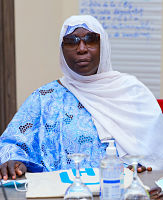share

Fama Ka during the workshop gender and disability in Saly, Senegal, in February 2022. | © Fran6Concept / HI
My name’s Fama Ka. I’m the mayor of Mbour in Senegal. I’ve had a visual impairment since I was 13. I’m now 54. I am a national and regional women’s representative for disabled people’s organisations.
 I have a long track record in fighting for women’s rights, particularly the rights of women with disabilities. I am a women’s representative for several women’s and disabled people’s organisations. I’ve been involved in campaigning since 1990. I’ve represented Senegalese and African women with visual impairments in Kenya, Canada, Burkina Faso, Japan and Thailand. I am vice-chair of the Senegalese Federation of Disabled People’s Organisations and general secretary of the National Committee of Women with Disabilities.
I have a long track record in fighting for women’s rights, particularly the rights of women with disabilities. I am a women’s representative for several women’s and disabled people’s organisations. I’ve been involved in campaigning since 1990. I’ve represented Senegalese and African women with visual impairments in Kenya, Canada, Burkina Faso, Japan and Thailand. I am vice-chair of the Senegalese Federation of Disabled People’s Organisations and general secretary of the National Committee of Women with Disabilities.
I am also the treasurer of the Pikine organisation of persons with disabilities and member of the drop-in centre run by the organisation for women with disabilities, one of HI’s partners. I listen to a lot of abused women. They share their experiences, their problems and their needs with me. This drop-in centre has made an enormous difference and I’m proud I helped set it up.
Women didn’t have anywhere they could go to talk about their feelings or to share their problems. This centre is a place where they can open up to their peers and talk about the difficulties they face.
I was proud of being a girl and I am proud of being a woman. But women in our country suffer all sorts of abuse: psychological, verbal, physical, and so on. Especially women like us, with disabilities. We suffer abuse both as women and as people with disabilities.
Women with disabilities in Senegal are high committed. They join organisations and form alliances with other women. They’re improving their lives because they’re seizing the opportunity to talk about their problems.
Their fight is now everyone’s fight - the fight of all women.
Society needs to advance our rights. It must fight alongside people with disabilities. Just as it advances the rights of children, it must take action and advance the rights of people with disabilities. We need to promote local and inclusive development and involve people with disabilities in managing communities. Fortunately, things are changing, and more attention is being paid to the problems facing women with disabilities. For example, as part of a job creation scheme, I’m currently training 15 young women with visual impairments to run their own businesses.
The role of our partner, HI, is to support people with disabilities in their struggle and to supply their projects with technical and financial assistance. HI has worked alongside women with disabilities for many years, including by helping to advance their rights and promote their inclusion in society and the workplace, and by funding their projects. HI has done a lot for people with disabilities, and this is something we welcome and value.
Things have changed. Many women with disabilities now help run society. They have a voice on decision-making bodies and can influence the way people behave.
What also drives me is the fact that I, as a visually impaired woman, have a role to play in society. I even train people without disabilities now because they have confidence in people with disabilities.
I am proud to be not only a woman but a woman with disabilities. Because this has not prevented me from helping my sisters or from helping develop my local community and country.
I want to appeal to my sisters to continue combating violence against women and to advance our rights. The goal is to build a society where no one is excluded, where everyone has the same opportunities and privileges.
I work with young women with disabilities to prepare the next generation of campaigners. I have been fighting for people with disabilities for three decades; it is time to pass on my knowledge and skills. These young women with disabilities will continue the work I started so many years ago.
Just as others helped me become who I am, I will pass on what I know to the younger generation, so they continue the fight.








HI is an independent and impartial aid organisation working in situations of poverty and exclusion, conflict and disaster. We work alongside people with disabilities and vulnerable populations, taking action and bearing witness in order to respond to their essential needs, improve their living conditions and promote respect for their dignity and fundamental rights.
HI is an independent and impartial aid organisation working in situations of poverty and exclusion, conflict and disaster. We work alongside people with disabilities and vulnerable populations, taking action and bearing witness in order to respond to their essential needs, improve their living conditions and promote respect for their dignity and fundamental rights.